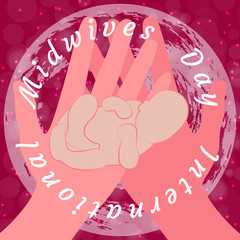
- ENGLISH/ITALIANO
- About Us
- Courses
- Teaching staff
- Research
- Enrolment
- Student services
- Faq and Contact
- News
- Vacancies
- Work with us

Since May 5, 1991, the International Day of Midwives is celebrated all over the world. The World Health Organization has stated that it is deeply proud of this healthcare profession which is invaluable for the health of people around the world.
“Without midwives, sustainable development goals would not be achieved,” said Tedros Adhanom, WHO Director-General.
A vision also shared by UniCamillus, International Medical University of Rome, which within its wide educational offer, delivers the Degree Course in Health Professions in Obstetrics trying to convey to its students the distinctive values of the University: internationality, humanitarian mission and inclusive medicine.
Midwives, especially in difficult times such as the current one caused by Covid-19, demonstrate that they have countless skills.
Sofia Colaceci, Researcher and Professor of Midwifery in the Midwifery Degree Course at UniCamillus, explains below how midwives remain alongside women of all nationalities, religions, social classes, not only in assisting pregnancies, childbirth and post partum and in the promotion of breastfeeding, but at every stage of their life.
Why is it important to dedicate an International Day to the midwife figure?
The midwife deserves to be recognized and celebrated as the crucial health figure for health
of women, boys and girls and, in general, families and the community. The World Health Organization has estimated that 350,000 women die every year from complications that occurred during pregnancy and childbirth; 2.6 million babies, however, are born dead and over 3 million babies die after childbirth. Many of these deaths could be avoided thanks to the assistance of a midwife.
How important is the role of midwife currently compared to the past?
Obstetrician activities are commonly and exclusively associated with the delivery room environment.
The midwife is also a very transversal professional able to accompany the woman in all phases of her life cycle. The midwife, for example, can follow physiological pregnancies, so-called low risk, in complete autonomy and responsibility, collaborating with specialists if pathological problems arise that require medical intervention. Even after childbirth, the role of midwife is crucial to support women in the management and care of the newborn, just think of support for breastfeeding. Beyond the birth path, obstetrician activities concern sexual education aimed at adolescents, family planning, prevention and treatment of pelvic health, the prevention and detection of tumors in the female sphere, as well as more general the gynecological area. It is therefore evident that the midwife accompanies the woman in all the main stages of her life cycle up to the post-fertile period. Finally, it should be remembered that the midwife currently does not carry out her professional activity only within hospitals, but also in consultants, public or private clinics, as well as in maternity homes and at home if women choose to give birth in an extra-hospital environment. .
What is the role of midwife in Covid times?
The women obviously continued and continue to give birth despite the Covid emergency. It follows that midwives are in the front line to deal with this situation, while still ensuring adequate assistance. In particular, the birth centres were organized by activating ad hoc routes, Covid and non Covid, for pregnant women and women who have recently given birth. Furthermore, it is of utmost importance to disclose appropriate information to calm women and couples about the most common fears of the case. Specifically, to date no cases of infection have been detected in those born to pregnant women who are positive for Covid and, similarly, there has been no risk of transmitting Covid via breast milk.
